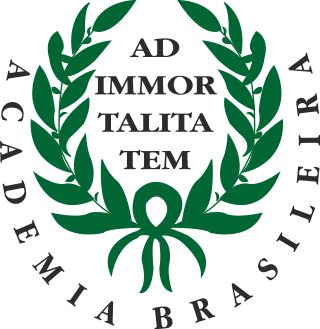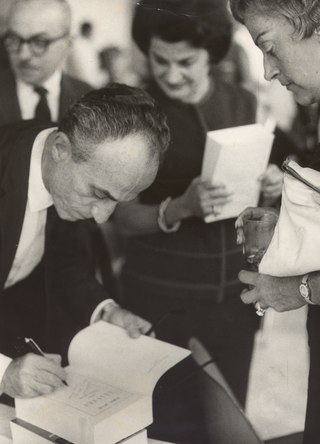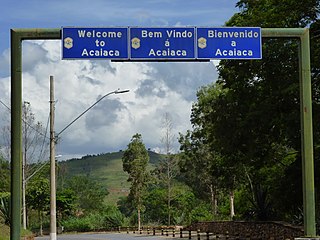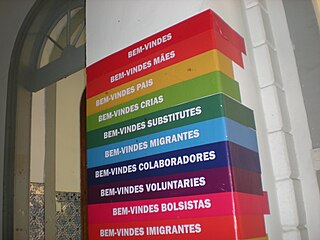
Portuguese is a Western Romance language of the Indo-European language family, originating in the Iberian Peninsula of Europe. It is the official language of Portugal, Brazil, Cape Verde, Angola, Mozambique, Guinea-Bissau and São Tomé and Príncipe, while having co-official language status in East Timor, Equatorial Guinea, and Macau. Portuguese-speaking people or nations are "Lusophones". As the result of expansion during colonial times, a cultural presence of Portuguese speakers is also found around the world. Portuguese is part of the Ibero-Romance group that evolved from several dialects of Vulgar Latin in the medieval Kingdom of Galicia and the County of Portugal, and has kept some Celtic phonology.

Aurélio Buarque de Holanda Ferreira was a Brazilian lexicographer, philologist, translator, and writer, best known for editing the Novo Dicionário da Língua Portuguesa, a major dictionary of the Portuguese language.

The Academia Brasileira de Letras (ABL) is a Brazilian literary non-profit society established at the end of the 19th century. The first president, Machado de Assis, declared its foundation on Tuesday, 15 December 1896, with the by-laws being passed on Thursday, 28 January 1897. On Tuesday, 20 July of the same year, the academy started its operation.

Macro-Jê is a medium-sized language family in South America, mostly in Brazil but also in the Chiquitanía region in Santa Cruz, Bolivia, as well as (formerly) in small parts of Argentina and Paraguay. It is centered on the Jê language family, with most other branches currently being single languages due to recent extinctions.

Caipiras are a traditional people from the Centre-South of Brazil, the term "caipira" probably originating from Tupi language, originally means "bush cutter", having been identified as a printed symbol for the first time in 1872. The first Caipiras were the bandeirantes, who received this denomination through the Guaianá people who inhabited the region of the Médio Tietê, in São Paulo.
The Brazilian Institute of Public Opinion and Statistics does market research to provide information regarding Brazilian and Latin American markets. IBOPE provides data on media, public opinion, voting intention, consumption, behavior, marketing, branding and other issues as required by clients.

Antônio Houaiss was a Brazilian lexicographer, diplomat, writer and translator.

Portuguese is the official and national language of Brazil being widely spoken by most of the population. Brazil is the most populous Portuguese-speaking country in the world, with its lands comprising the majority of Portugal’s former colonial holdings in the Americas.

Neo-Manueline is a revival style of architecture which drew from the 16th century Manueline Late Gothic architecture of Portugal. Neo-Manueline constructions have been built across Portugal, Brazil, and the Lusophone world.

Luis Carlos Verzoni Nejar, better known as Carlos Nejar, is a Brazilian poet, author, translator and critic, and a member of the Academia Brasileira de Letras. One of the most important poets of its generation, Nejar, also called "o poeta do pampa brasileiro", is distinguished for his use of an extensive vocabulary, alliteration, and pandeism. His first book, Sélesis, was published in 1960.
Willem Leo Marie (Leo) Wetzels is a full professor at the Vrije Universiteit Amsterdam in the Netherlands and Directeur de recherche at Laboratoire de Phonétique et Phonologie (LPP), CNRS/Sorbonne-Nouvelle in Paris. He is Editor-in-Chief of Probus International, the Journal of Latin and Romance Linguistics.
Orlanda Amarílis Lopes Rodrigues Fernandes Ferreira, known as Orlanda Amarílis was a Cape Verdean writer. She is considered to be a noteworthy writer of fiction whose main literary themes include perspectives on women’s writing, with depictions of various aspects of the lives of Cape Verdean women as well as depictions of the Cape Verdean diaspora. She has been described as "indisputably one of Cape Verde’s most talented writers".

Marcelo Caetano Moraes is a writer, professor and pianist from Brazil., critic, journalist.

Tatiana Salem Levy is a Brazilian writer and translator.

Benjamin Abdala Júnior is a Brazilian writer, scholar, and literary critic. His first book, A Escrita Neo-Realista, was published in 1981. He published the book Antologia da Poesia Brasileira - Realismo/Parnasianismo in 1985. He has written over 40 published books and hundreds of chapters in book collection,articles in newspapers and literary magazines .He has worked with the main Brazilian Scientific Agencies evaluating scholarships and grants requested by researchers from the main Brazilian universities. Benjamin has also lived in Portugal and France, where he expanded his research and gave lectures on Comparative, Portuguese and African Literatures. He has been invited to the main universities in Africa, China, United States, Canada, France, England, Portugal, Austria, Tchecoslovaquia, Russia and Chile, giving lectures on African Literatures of Portuguese Speaking Countries, Comparative Literature, Neo-realism in Portugal and Brazil, among other subjects. Grandson of Lebanese immigrants, he received a Merit Medal celebrating 130 years of Middle Eastern Immigration to South America from BibliASPA - Biblioteca e Centro de Pesquisa América do Sul - Países Árabes. He has 3 children and 3 grandchildren, and lives in São Paulo. He is retired from University of São Paulo after 35 years of contribution as professor and administrator, but he is still actively involved in the Faculdade de Filosofia, Letras and Ciencias Humanas as a researcher.

Hirondina Joshua, is a Mozambican poet and prose writer. Her name translates as swallow in Latin. Member of Associação dos Escritores Moçambicanos, she is part of the new generation of Mozambican authors. She is among the 122 authors of the Brazilian project Modernos & Ternos where she "talks" to modernity in a record of the 100th anniversary of the Modern Art Week. She participated in the Edinburgh International Book Festival, the largest public celebration of the written word in the world.

Gender-neutral language in Portuguese is a recent strand of demands for greater gender equality and social inclusion between men, women and non-binary individuals. It can be divided into inclusive or non-sexist language, and non-binary or neuter language or neolanguage. Inclusive language aims to use existing words to include all genders, while neuter language uses new or modified words to accomplish this.
Mário Alberto Perini is a Brazilian linguist known mainly for his work on the description of Brazilian Portuguese. He is professor emeritus at the Federal University of Minas Gerais; he has also taught at the University of Illinois and at the University of Mississippi. In 2021, Perini was elected Honorary Member of the Brazilian Linguistics Association.
Maria Helena de Moura Neves was a Brazilian linguist known for her work on language use, especially functional approaches to Portuguese grammar. She also conducted research on the history and teaching of grammar. She was professor emerita at São Paulo State University, and also lectured at Mackenzie Presbyterian University. In 2022 she received the Ester Sabino Award in the Senior Researcher category.

Claudio Jorge Willer was a Brazilian poet, translator, essayist and critic.















